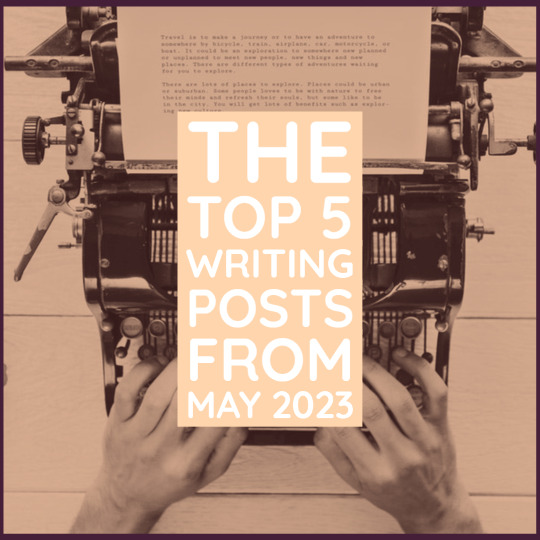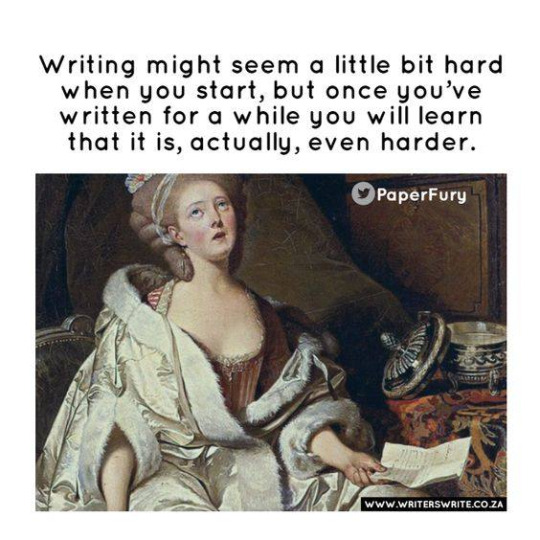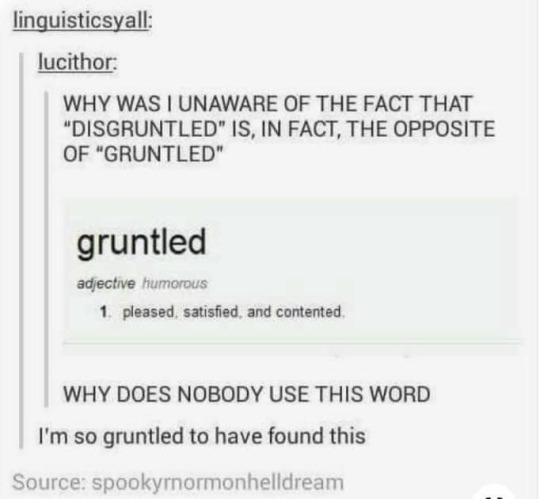Text


1 note
·
View note
Text


0 notes
Photo

The Top 5 Writing Posts From May 2023
In this post, we share the top 5 writing posts from May 2023.
Every month, we look at the posts that people read the most. These were the new Writers Write posts you enjoyed in May 2023:
How To Make Any Story Creepy Using The Uncanny
31 Writing Prompts For May 2023
‘How To Steal Like An Artist’ – Writing Advice From Austin Kleon
How Travel Can Boost Your Creativity
The Top 5 Writing Posts From April 2023
Previous Posts
The Top 5 Writing Posts From April 2023
The Top 5 Writing Posts From March 2023
The Top 5 Writing Posts From February 2023
Top Tip: Find out more about our workbooks and online courses in our shop.
79 notes
·
View notes
Text
*Insert frustrating noises here*

1 note
·
View note
Text
ADVERBS: When to Avoid them
This post is about when to not use adverbs. However, adverbs are not all evil. There are tons of places where they strengthen your writing. I’ll cover that in a future post!
Adverbs are commonly used to modify a verb. Typically, this is done by adding an “-ly” to an adjective.
He danced swiftly.
She cried loudly.
He said angrily.
Instead of inserting an adverb here, you might consider going into more detail on the action. Show us how he dances swiftly:
He was light on his feet, empty in his mind. He let the music guide him. His movements reminded us of a feather caught in the ocean’s breeze.
Adverbs in dialogue tags
• A bad example of adverb usage in a speech tag:
“Don’t do that.” He said angrily.
• We can make this sentence stronger by showing his anger in an action, rather than telling it through the adverb “angrily.”
He shoved the boy with a snarl. “Don’t do that.”
• We can also adjust the dialogue itself, making the anger present in the character’s voice.
“Stop! Don’t do that. You’re pissing me off.” He said.
Adverbs being used unnecessarily
“He was so tired that he would eventually fall to the ground.”
“After crying all night, Sarah finally fell asleep.”
“The cat was very cute.”
These types of adverbs can slow down the pace and add an extra word that isn’t needed. The sentence is more direct and stronger without it.
“He was so tired that he would fall to the ground.”
“After crying all night, Sarah fell asleep.”
“The cat was adorable.”
Adverbs that take away the urgency
If used in the wrong place, or too often, adverbs such as suddenly, immediately, and abruptly can slow down an action that is meant to happen quickly. The more wordy your sentence is, the less clear and concise it is.
“It was quiet until suddenly a loud noise erupted.”
“It was quiet until a loud noise erupted.”
“The red truck abruptly slammed into my car.”
“The red truck slammed into my car.”
Instagram: coffeebeanwriting

📖 ☕ Official Blog: www.byzoemay.com
806 notes
·
View notes
Text
physical intimacy prompts
holding hands during a stressful situation
smiling in-between kisses
touching foreheads
cheek kisses
slow dancing
intertwining fingers
comparing hand sizes
resting your head on your partner's lap
piggy back rides
standing on your tip toes to reach your partner's lips
kissing your partner's wounds
forehead kisses
falling asleep on your partner's shoulder
bridal carries
spooning
rolling over in bed, switching positions during a kiss
embracing your partner
intertwining fingers when making love
pulling away from a kiss, deeply looking into each other's eyes, appreciating being here with each other before diving back in
nudging into the crook of your partner's neck
being carried/tucked into bed, after having fallen asleep on the couch waiting for your partner to come home
saying ''i love you'' in-between kisses
nose boops
back rubs
tracing fingers down your partner's chest
hand on chest during a casual conversation
bumping into each other
hugs that last longer than they should
showering together
hands around the waist
straddling your partner's thighs
helping your partner undress
playing with your partner's hair
falling asleep to your partner's heartbeat
resting a hand on your partner's back
squeezing each other's hands
sitting in your partner's lap
cupping your partner's face
tickling
linking arms with each other
exploring each other's lips
caressing your partner's face
brushing your lips together, lingering for a moment
jumping into your partner's arms
wrapping legs around your partner
tucking a strand of hair behind your partner's ear
pulling your partner into your lap
hugging from behind
lifting your partner off the ground
holding hands across the table
holding hands under the table
bear hugs
caressing your partner's hand
laying a hand on your partner's thigh
literally sharing a sweater
slapping your partner's butt
tummy kisses
feeling each other's pulse
glancing at each other's lips
falling asleep while cuddling on the couch
climbing back into bed, onto your partner's body to wake them up
15K notes
·
View notes
Text
50 WORDS TO USE INSTEAD OF “SAID”
Do you ever find yourself over-using the word “said” in your writing? Try using these words/phrases instead:
stated
commented
declared
spoke
responded
voiced
noted
uttered
iterated
explained
remarked
acknowledged
mentioned
announced
shouted
expressed
articulated
exclaimed
proclaimed
whispered
babbled
observed
deadpanned
joked
hinted
informed
coaxed
offered
cried
affirmed
vocalized
laughed
ordered
suggested
admitted
verbalized
indicated
confirmed
apologized
muttered
proposed
chatted
lied
rambled
talked
pointed out
blurted out
chimed in
brought up
wondered aloud
(NOTE: Keep in mind that all of these words have slightly different meanings and are associated with different emotions/scenarios.)
63K notes
·
View notes
Text
Words to describe facial expressions
Absent: preoccupied
Agonized: as if in pain or tormented
Alluring: attractive, in the sense of arousing desire
Appealing: attractive, in the sense of encouraging goodwill and/or interest
Beatific: blissful
Black: angry or sad, or hostile
Bleak: hopeless
Blinking: surprise, or lack of concern
Blithe: carefree, lighthearted, or heedlessly indifferent
Brooding: anxious and gloomy
Bug eyed: frightened or surprised
Chagrined: humiliated or disappointed
Cheeky: cocky, insolent
Cheerless: sad
Choleric: hot-tempered, irate
Darkly: with depressed or malevolent feelings
Deadpan: expressionless, to conceal emotion or heighten humor
Despondent: depressed or discouraged
Doleful: sad or afflicted
Dour: stern or obstinate
Dreamy: distracted by daydreaming or fantasizing
Ecstatic: delighted or entranced
Faint: cowardly, weak, or barely perceptible
Fixed: concentrated or immobile
Gazing: staring intently
Glancing: staring briefly as if curious but evasive
Glazed: expressionless due to fatigue or confusion
Grim: fatalistic or pessimistic
Grave: serious, expressing emotion due to loss or sadness
Haunted: frightened, worried, or guilty
Hopeless: depressed by a lack of encouragement or optimism
Hostile: aggressively angry, intimidating, or resistant
Hunted: tense as if worried about pursuit
Jeering: insulting or mocking
Languid: lazy or weak
Leering: sexually suggestive
Mild: easygoing
Mischievous: annoyingly or maliciously playful
Pained: affected with discomfort or pain
Peering: with curiosity or suspicion
Peeved: annoyed
Pleading: seeking apology or assistance
Quizzical: questioning or confused
Radiant: bright, happy
Sanguine: bloodthirsty, confident
Sardonic: mocking
Sour: unpleasant
Sullen: resentful
Vacant: blank or stupid looking
Wan: pale, sickly
Wary: cautious or cunning
Wide eyed: frightened or surprised
Withering: devastating
Wrathful: indignant or vengeful
Wry: twisted or crooked to express cleverness or a dark or ironic feeling
104K notes
·
View notes
Text
WORDS TO USE INSTEAD OF: LAUGH / LAUGHED / LAUGHING
Do you ever find yourself over-using the verb “laugh” (or “laughed” or “laughing”) in your writing? Try using these words instead:
giggle / giggled / giggling
chuckle / chuckled / chuckling
snicker / snickered / snickering
cackle / cackled / cackling
guffaw / guffawed / guffawing
grin / grinned / grinning
titter / tittered / tittering
snort / snorted / snorting
chortle / chortled / chortling
howl / howled / howling
roar / roared / roaring
cachinnate / cachinnated / cachinnating
snigger / sniggered / sniggering
mock / mocked / mocking
crack up / cracked up / cracking up
bust a gut / busted a gut / busting a gut
in stitches / in stitches / in stitches
burst into laughter / burst into laughter / bursting into laughter
die of laughter / died of laughter / dying of laughter
split one’s sides / split one’s sides / splitting one’s sides
(NOTE: Keep in mind that all of these words have slightly different meanings and are associated with different emotions/scenarios.)
17K notes
·
View notes
Photo

This is an ultimate masterlist of many resources that could be helpful for writers. I apologize in advance for any not working links. Check out the ultimate writing resource masterlist here (x) and my “novel” tag here (x).
✑ PLANNING
Outlining & Organizing
For the Architects: The Planning Process
Rough Drafts
How do you plan a novel?
Plot Development: Climax, Resolution, and Your Main Character
Plotting and Planing
I Have An Idea for a Novel! Now What?
Choosing the Best Outline Method
How to Write a Novel: The Snowflake Method
Effectively Outlining Your Plot
Conflict and Character within Story Structure
Outlining Your Plot
Ideas, Plots & Using the Premise Sheets
✑ INSPIRATION
Finding story ideas
Choosing ideas and endings
When a plot isn’t strong enough to make a whole story
Writing a story that’s doomed to suck
How to Finish What You Start: A Five-Step Plan for Writers
Finishing Your Novel
Finish Your Novel
How to Finish Your Novel when You Want to Quit
How To Push Past The Bullshit And Write That Goddamn Novel: A Very Simple No-Fuckery Writing Plan
✑ PLOT
In General
25 Turns, Pivots and Twists to Complicate Your Story
The ABCs (and Ds and Es) of Plot Development
Originality Is Overrated
How to Create a Plot Outline in Eight Easy Steps
Finding Plot: Idea Nets
The Story Goal: Your Key to Creating a Solid Plot Structure
Make your reader root for your main character
Creating Conflict and Sustaining Suspense
Tips for Creating a Compelling Plot
The Thirty-six (plus one) Dramatic Situations
Adding Subplots to a Novel
Weaving Subplots into a Novel
7 Ways to Add Subplots to Your Novel
Crafting a Successful Romance Subplot
How to Improve your Writing: Subplots and Subtext
Understanding the Role of Subplots
How to Use Subtext in your Writing
The Secret Life of Subtext
How to Use Subtext
Beginning
Creating a Process: Getting Your Ideas onto Paper (And into a Story)
Why First Chapters?
Starting with a Bang
In the Beginning
The Beginning of your Novel that isn’t the Beginning of your Novel
A Beginning from the Middle
Starting with a Bang
First Chapters: What To Include @ The Beginning Writer
23 Clichés to Avoid When Beginning Your Story
Start Writing Now
Done Planning. What Now?
Continuing Your Long-Format Story
How to Start a Novel
100 best first lines from novels
The First Sentence of a Book Report
How To Write A Killer First Sentence To Open Your Book
How to Write the First Sentence of a Book
The Most Important Sentence: How to Write a Killer Opening
Hook Your Reader from the First Sentence: How to Write Great Beginnings
Foreshadowing
Foreshadowing and the Red Hering
Narrative Elements: Foreshadowing
Foreshadowing and Suspense
Foreshadowing Key Details
Writing Fiction: Foreshadowing
The Literary Device of Foreshadowing
All About Foreshadowing in Fiction
Foreshadowing
Flashbacks and Foreshadowing
Foreshadowing — How and Why to Use It In Your Writing
Setting
Four Ways to Bring Settings to Life
Write a Setting for a Book
Writing Dynamic Settings
How To Make Your Setting a Character
Guide for Setting
5 Tips for Writing Better Settings
Building a Novel’s Setting
Ending
A Novel Ending
How to End Your Novel
How to End Your Novel 2
How to End a Novel With a Punch
How to End a Novel
How to Finish a Novel
How to Write The Ending of Your Novel
Keys to Great Endings
3 Things That End A Story Well
Ending a Novel: Five Things to Avoid
Endings that Ruin Your Novel
Closing Time: The Ending
✑ CHARACTER
Names
Behind the Name
Surname Meanings and Origins
Surname Meanings and Origins - A Free Dictionary of Surnames
Common US Surnames & Their Meanings
Last Name Meanings & Origins
Name Generators
Name Playground
Different Types of Characters
Ways To Describe a Personality
Character Traits Meme
Types of Characters
Types of Characters in Fiction
Seven Common Character Types
Six Types of Courageous Characters
Creating Fictional Characters (Masterlist)
Building Fictional Characters
Fiction Writer’s Character Chart
Character Building Workshop
Tips for Characterization
Fiction Writer’s Character Chart
Advantages, Disadvantages and Skills
Males
Strong Male Characters
The History and Nature of Man Friendships
Friendship for Guys (No Tears!)
‘I Love You, Man’ and the rules of male friendship
Male Friendship
Understanding Male Friendship
Straight male friendship, now with more cuddling
Character Development
P.O.V. And Background
Writing a Character: Questionnaire
10 Days of Character Building
Getting to Know Your Characters
Character Development Exercises
✑ STYLE
Chapters
How Many Chapters is the Right Amount of Chapters?
The Arbitrary Nature of the Chapter
How Long is a Chapter?
How Long Should Novel Chapters Be?
Chapter & Novel Lengths
Section vs. Scene Breaks
Dialogue
The Passion of Dialogue
25 Things You Should Know About Dialogue
Dialogue Writing Tips
Punctuation Dialogue
How to Write Believable Dialogue
Writing Dialogue: The Music of Speech
Writing Scenes with Many Characters
It’s Not What They Say …
Top 10 Tips for Writing Dialogue
Speaking of Dialogue
Dialogue Tips
Interrupted Dialogue
Two Tips for Interrupted Dialogue
Show, Don’t Tell (Description)
“Tell” Makes a Great Placeholder
The Literary Merit of the Grilled Cheese Sandwich
Bad Creative Writing Advice
The Ultimate Guide to Writing Better Than You Normally Do
DailyWritingTips: Show, Don’t Tell
GrammarGirl: Show, Don’t Tell
Writing Style: What Is It?
Detail Enhances Your Fiction
Using Sensory Details
Description in Fiction
Using Concrete Detail
Depth Through Perception
Showing Emotions & Feelings
Character Description
Describing Your Characters (by inkfish7 on DeviantArt)
Help with Character Development
Creating Characters that Jump Off the Page
Omitting Character Description
Introducing Your Character(s): DON’T
Character Crafting
Writer’s Relief Blog: “Character Development In Stories And Novels”
Article: How Do You Think Up Your Characters?
5 Character Points You May Be Ignoring
List of colors, hair types and hairstyles
List of words to use in a character’s description
200 words to describe hair
How to describe hair
Words used to describe the state of people’s hair
How to describe your haircut
Hair color sharts
Four Ways to Reveal Backstory
Words Used to Describe Clothes
Flashbacks
Using Flashbacks in Writing
Flashbacks by All Write
Using Flashback in Fiction
Fatal Backstory
Flashbacks as opening gambit
Don’t Begin at the Beginning
Flashbacks in Books
TVTropes: Flashback
Objects in the Mirror Are Closer Than They Appear: Flashback Techniques in Fiction
3 Tips for Writing Successful Flashbacks
The 5 Rules of Writing Effective Flashbacks
How to Handle Flashbacks In Writing
Flashbacks and Foreshadowing
Reddit Forum: Is a flashback in the first chapter a good idea?
Forum Discussing Flackbacks
P.O.V
You, Me, and XE - Points of View
What’s Your Point of View?
Establishing the Right Point of View: How to Avoid “Stepping Out of Character”
How to Start Writing in the Third Person
The Opposite Gender P.O.V.
LANGUAGE
How To Say Said
200 Words Instead of Said
Words to Use Instead of Said
A List of Words to Use Instead of Said
Alternatives to “Walk”
60 Synonyms for “Walk”
✑ USEFUL WEBSITES/LINKS
Grammar Monster
Google Scholar
GodChecker
Tip Of My Tounge
Speech Tags
Pixar Story Rules
Written? Kitten!
TED Talks
DarkCopy
Family Echo
Some Words About Word Count
How Long Should My Novel Be?
The Universal Mary Sue Litmus Test
Writer’s “Cheat Sheets”
Last but not least, the most helpful tool for any writer out there is Google!
109K notes
·
View notes











